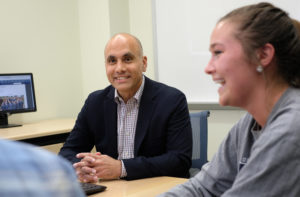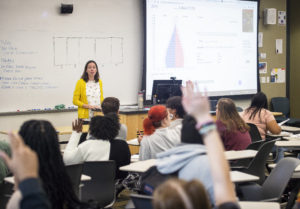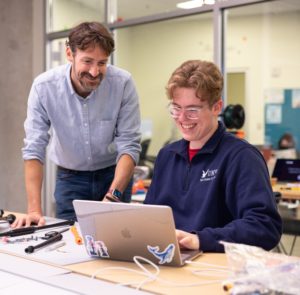When you ask how UMW is using ChatGPT in the classroom, you’ll hear a variety of responses. Some students and faculty have yet to hear of the emerging AI technology. Some know it well and make use of it for their assignments whether instructors know it or not. Some say they’re being encouraged by their professors to use it wisely as part of the writing process.
Several UMW faculty gathered on Feb. 8, 2023, to share their professional and personal experience with ChatGPT in an open discussion jointly led by the Center for Teaching and Digital Learning Support.
Starting With the Process

Professor of Communication and Chair of the Department of Communication and Digital Studies Anand Rao kicked off the conversation, after spending a semester exploring and embracing ChatGPT in his debate and speech class.
“What are some of the possibilities? What’s the potential?” he asked.
Rao teaches students how to prepare early drafts of their speeches using the ChatGPT Chrome extension, which gives them a chance to incorporate sources. Following the first draft, he instructs students to track down each source and validate it, then find more, revise and evaluate.
“We have students that we assume have these digital skills, but many of them do not. If we don’t teach our students to use [this type of tool] effectively and responsibly, they will use it anyway,” he said.
Assistant Professor of Writing Studies and Digital Studies Brenta Blevins has found the classroom to be the ideal place to explicitly discuss the writing process and AI, one of many possible tools that can help students learn to refine their ideas and articulate them. Noting the benefit of emphasizing the writing process over solely the product, she also sees potential pedagogical impacts of the emerging technology.
A Philosopher’s Dilemma
“As a philosopher, you try to get it into a conversation, but it’s just not that. It doesn’t have anything like a consciousness,” said Lecturer in Philosophy Michael Reno. Instead, he turned the conversation to his students and listened to how they are actually using ChatGPT, from computer science coursework to written assignments.
He’s most interested in using the high-tech tool as a coach. For example, students can ask it for a prompt, do their own writing, and then see how it revises to improve their prose, and he’s given students the option to incorporate it in particular assignments in particular ways.
However, there’s a clear caveat at this stage, he noted: “Students realize it’s easier to just do the assignment than to incorporate ChatGPT into it.”
Accounting for Additional Possibilities

Professor of Accounting and Director of the Center for Business Research Dave Henderson views ChatGPT as incredible software reminiscent to the surge of the internet in the ’80s and ’90s, and he’s seeing how it can generate effective computer code but only if the user knows which questions to ask. He has his own questions around cheating, though.
“Is it the end of the take-home essay?” he asked the group. For now, he’s returning to in-classroom exams in some cases.
Associate Professor of Geography Caitie Finlayson has another take on using ChatGPT for questions. She’ll build out a lecture or activity, input it into ChatGPT and ask for discussion questions. Or she’ll ask it to test a short-answer question to see how her students might answer, then revise and refine the question to get more to the point.
She’s also built ChatGPT into her class discussions, going meta by asking it “How can we in the U.S. deal with the inequality that might result from the rise of automation?” The class will ponder that one in upcoming weeks, as it also tests bias through media analysis.
Scripting Use of ChatGPT

Director of the Digital Knowledge Center and Adjunct Instructor in Communications and Digital Studies Cartland Berge encourages students in his video production class to experiment with ChatGPT, particularly for the early stages of their scripting process, when they’re planning and writing their shows. The class produces live YouTube-style TV, called “Are We Live?” available at umwlive.com.
By week five of the semester, no one had taken him up on the opportunity to test it out, though they did creatively add ChatGPT as a character in a potential show, aptly set on a college campus.
“It’s an opportunity to see a good model,” he said of the idea to create an initial script using AI. “This is a tool that could be useful the same way that a calculator is useful for math.”
So now, he’s thinking of assigning an episode that’s entirely ChatGPT scripted.
Stay tuned.
UMW’s Center for Teaching in collaboration with Digital Learning Support plan to host additional discussions and resource-sharing opportunities throughout the spring semester.